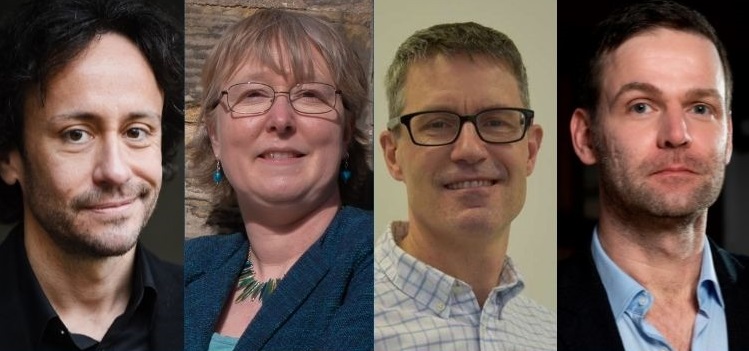Four they are jolly good Fellows

A philosopher, a genomic epidemiologist, a historian and a biologist from the University of St Andrews have been announced as new Fellows of the Royal Society of Edinburgh (RSE).
The RSE, Scotland’s national academy, today (Tuesday 22 March) unveils 80 new Fellows from the worlds of academia, the arts, business, public service and civil society across Scotland and beyond.
St Andrews academics Franz Berto, Professor of Logic and Metaphysics; Aileen Fyfe, Professor of Modern History; Matthew Holden, Professor of Pathogen Genomics; and Christian Rutz, Professor of Biology will join the RSE’s current Fellowship of around 1700 Fellows, who are recognised as being some of the greatest thinkers, researchers and practitioners working in or with Scotland today.
The Royal Society of Edinburgh is a leading educational charity which operates on an independent and non-party-political basis to provide public benefit throughout Scotland.
Fellows give their time and expertise for free to support the RSE in delivering its mission of ‘knowledge made useful’, helping the institution to continue to provide independent and expert advice to policymakers, support aspiring entrepreneurs, develop research capacity and leadership, inspire and facilitate learning, and engage with the general public through inspiring events.
Professor Franz Berto holds the Chair of Logic and Metaphysics at the University of St Andrews and his research is in logic (non-classical logic, the logic of knowledge and of suppositional thinking), ontology, and its methodology. He has published papers and monographs including How to Sell a Contradiction (2007), Existence as a Real Property (2013), Ontology and Metaontology (2015), Impossible Worlds (2019) and Topics of Thought (forthcoming 2022) and is editor-in-chief of The Philosophical Quarterly.
Professor Aileen Fyfe is a historian of science, technology and publishing, with particular interests in the construction and communication of knowledge, and the way in which scholarly communities operate. Her recent work investigates the history of academic publishing, through a detailed study of the world’s longest-running scientific journal: the Philosophical Transactions of the Royal Society, founded in 1665. Her analysis of the business models underpinning scientific journals offers a new perspective on the transition to open access publishing; while her work on peer review has revealed that historical social and cultural conditions have left their legacy in modern editorial and evaluation processes. She is an active mentor and advocate for women in academia, co-editing Academic Women Now! (RSE/YAS, 2016) and Academic Women Here! (St Andrews, 2018). She was a member of the first cohort of the RSE Young Academy of Scotland, and served as one of its first co-chairs.
Over the last two decades, Professor Matthew Holden’s work has focused on using whole genome sequencing as a research tool to investigate the evolution of pathogens and their ability to cause disease, and also as a clinical tool to identify outbreaks and trace the spread of infectious diseases. Since the start of the Covid-19 pandemic, he has been seconded into Public Health Scotland as the Genomics Strategic Lead, helping build a SARS-CoV-2 sequencing service in the NHS and integrate the genome data generated into the public health response.
Professor Christian Rutz has broad interests in behavioural and evolutionary ecology, advanced animal tracking technologies, conservation science and policymaking, and research practice. A keen fieldworker, much of his research is driven by a deep curiosity about, and desire to protect, the natural world. Professor Rutz is well known for his studies on tool-using crows, his contributions to bio-logging science, and his efforts to improve research reproducibility. He is Founding President of the International Bio-Logging Society and Chair of the COVID-19 Bio-Logging Initiative. Professor Rutz was a Rhodes Scholar, BBSRC David Phillips Fellow and Radcliffe Fellow, and is currently a National Geographic Explorer.
Commenting on the news, Professor Sir John Ball, President of the RSE, said: “It is a privilege to be able to welcome our new Fellows, and we are inspired by the breadth of talent and experience in our Fellowship. Every single individual elected this year has shown exceptional levels of expertise and insight in their chosen field, and their input helps RSE effect real and lasting change in Scotland’s society.
“We look forward to working with our diverse Fellowship, who provide a crucial link between the world of academic research and practice with government, business and civil society”.
Musician Annie Lennox OBE is among those appointed to the Fellowship alongside Professor Mark Logan, the former Skyscanner Chief Operating Officer, Professor Marc Turner, Director at the Scottish National Blood Transfusion Service, and Dr Sabir Zazai, Chief Executive at the Scottish Refugee Council.
More information on the current membership and the work of the RSE can be found online.
Issued by the University of St Andrews Communications Office.